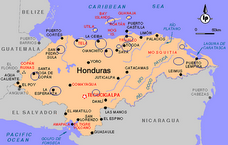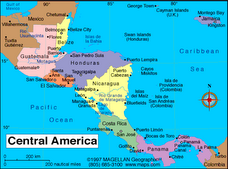I buried Old Man Can’t a while ago. That’s what Clarence Thomas´ grandfather used to tell him when he was younger. I don’t know Clarence Thomas personally, but my family got to know him a little better via a 20 minute spot on 60 Minutes last Sunday night. I wouldn’t be privy to said sliver of inspiration, not for lack of wanting to watch Morly Siefer, Lesley Stahl, Andy Rooney and the rest of the gang, seeing as it is my favorite television show…insert Huge Tool here…, if it weren’t for my wonderful older sister who forwarded it to me in an email. You see, between El Salvador’s version of PBS and the fútbol channel, there’s not much room for 60 Minutes on Southern Intibuca network television. And even if there was, it would come in all snowy, and who wants to watch snowy television, anyway?
60 Minutes is one of many, many things I miss about life in the states. If one wanted to make me even more homesick, they would add to that list: hot showers, Ina Garten´s cinnamon coffee cake, paved highways, timeliness, a queen-sized bed with down comforter and enough pillows to sleep a family of 5, privacy, personal space, not being stared at like I have 5 heads whenever I open my mouth.
Since I’ve arrived in Honduras, and, more specifically, to San Marcos de la Sierra, Intibuca, a lot has changed. I no longer spend Sunday afternoons reading the New York Times relaxing in my favorite chase lounge, nor do I jump into the navy blue BMW convertible to zip to Bikram Yoga and later grab a Grande Skim Latte from Starbucks. Instead I wake up to the sound of roosters crowing at 6 a.m. and run down the rock path as quickly as I can past the molino, geese, guyaba trees, et al… to the latrine to pee (one thing that hasn’t changed since I got here: my absurdly small bladder). I forgot what fresh blueberry muffins and pumpkin bread taste like because I eat tortillas and beans for breakfast every day. And I have a sneaky suspicion that the navy blue Beamer wouldn´t stand a chance against San Marcos´world famous absurdly horribly ugly and ill constructed dirt roads (in fact, I´d even be willing to wager that a monster truck would have a tough time).
At first glance it may sound like I’m whining and that is not at all my intention. Rather, as I sit in the municipal building waiting for someone to tell me to do something, I find it oddly cathartic to remember the life I’ve temporarily left behind. Maybe I’m weird, but remembering what I left behind helps remind me why I wanted to come to Honduras in the first place. I loved that life, I felt comfortable in that life, that life was easy. I didn’t have to think about getting out of bed—I just did it. And I reached a point where that started to scare me. What if I woke up and it was 50 years later and nothing had changed? Here, every minute is a challenge. Every time I want to say something, I have to think about it (What’s the third person of past pluscuamperfecto of hablar slash does that even exist?) Every where I go, people stare. I take my first real deep breath when I lie down to go to sleep. This is me Week 1. It gives me piece of mind to think much fun it will be to read this in 2 years and laugh, laugh at my ignorance, my impatience, my fears. Just because things here are different doesn’t mean they’re bad or wrong. In fact, the whole handmade-corn-tortillas-with-every-meal is already growing on me. Who knows, maybe in two years I’ll have forgotten have to speak English and shudder at the thought of drinking a cup of coffee without at least 10 spoonfuls of sugar in it.
A slice of perspective from John Steinbeck: Después de muchos anos, he llegado a comprender que no somos nosotros los que hacemos los viajes. Son los viajes los que nos hacen a nosotros. Roughly (and I emphasis the roughlypart) translated, Mr. Steinbeck means to say that After many years, I’ve learned that it is not we that make the trips, but the trips that shape us.
Friday, October 5, 2007
Subscribe to:
Comments (Atom)

